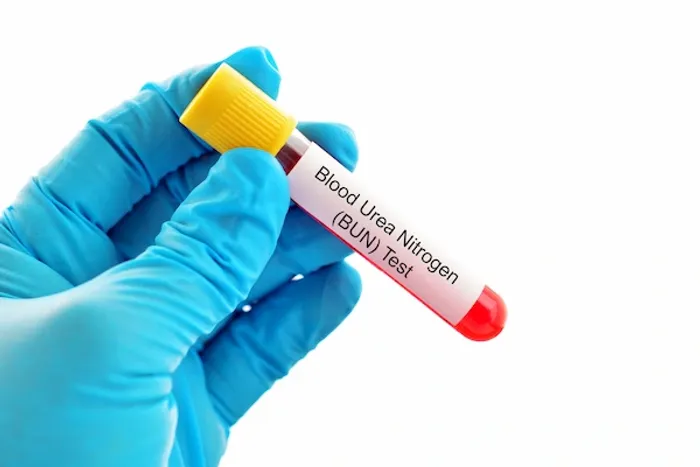Blood Urea Nitrogen Test Information
Learn about the Blood Urea Nitrogen (BUN) test, what it measures, and what your results mean. Understand the importance of this common blood test for kidney health.


If you’ve been advised to take a Blood Urea Nitrogen (BUN) test, you might be wondering what it is, why it’s needed, and what the results mean. Don’t worry—this simple guide will help you understand everything about the BUN test in an easy and friendly way.
What is a BUN Test?
The Blood Urea Nitrogen (BUN) test measures the amount of urea nitrogen in your blood. Urea nitrogen is a waste product formed when your body breaks down proteins from the food you eat. Your kidneys filter this waste out of your blood, and it leaves your body through urine.
A BUN test helps doctors check how well your kidneys and liver are working. High or low levels of urea nitrogen can indicate health problems, especially related to kidney function.
Why is the BUN Test Done?
Your doctor may recommend a BUN test if:
- You have symptoms of kidney disease (fatigue, swelling, frequent urination, or high blood pressure).
- You have liver disease or other conditions affecting protein metabolism.
- You’re being monitored for dehydration, malnutrition, or heart failure.
- You’re on dialysis or other treatments affecting kidney function.
Sometimes, the BUN test is done as part of a routine health checkup or along with other tests like creatinine to get a clearer picture of kidney health.
How is the BUN Test Performed?
The BUN test is a simple blood test:
1. A healthcare professional will clean a small area (usually your arm) with an antiseptic.
2. A needle is inserted to draw a small blood sample.
3. The sample is sent to a lab for analysis.
You don’t need any special preparation, but your doctor might ask you to fast (avoid food) for a few hours before the test if other tests are being done at the same time.
Consult a General Physician
What Do BUN Test Results Mean?
Normal BUN levels usually range between 7 to 20 mg/dL, but this can vary slightly depending on the lab.
High BUN Levels (Above Normal Range)
- Kidney problems (acute or chronic kidney disease)
- Dehydration (not drinking enough water)
- High protein diet (eating too much meat, fish, or dairy)
- Heart failure or shock (reduced blood flow to kidneys)
- Urinary tract obstruction (blockage preventing urine flow)
Low BUN Levels (Below Normal Range)
- Liver disease (since the liver produces urea)
- Malnutrition or low protein diet
- Overhydration (drinking too much water)
A high BUNtocreatinine ratio can indicate dehydration, gastrointestinal bleeding, or heart disease.
How Can You Maintain Healthy BUN Levels?
If your BUN levels are abnormal, your doctor will guide you on the next steps. However, some general tips to support kidney health include:
- Stay Hydrated – Drinking enough water helps kidneys flush out waste.
- Eat a Balanced Diet – Avoid excessive protein if advised by your doctor.
- Control Blood Pressure & Diabetes – These conditions can harm kidneys over time.
- Limit Alcohol & Avoid Smoking – Both can affect kidney and liver function.
- Exercise Regularly – Helps maintain overall health.
When Should You See a Doctor?
If your BUN test results are abnormal, your doctor may recommend:
- Further tests (like creatinine, eGFR, or urine tests).
- Dietary changes (adjusting protein intake).
- Medications (if kidney or liver disease is detected).
If you experience symptoms like fatigue, swelling, difficulty urinating, or severe dehydration, consult a doctor immediately.
Book a BUN Test with Apollo 24|7
If you need a BUN test or kidney function checkup, you can easily book a test online through Apollo 24|7. A simple blood test can help detect early signs of kidney problems and keep you healthy.
Final Thoughts
The BUN test is a helpful way to check kidney function and overall health. While abnormal results can be concerning, early detection allows for better management. Always follow your doctor’s advice and maintain a healthy lifestyle to keep your kidneys functioning well.
Stay informed, stay healthy!
(Need a BUN test? Schedule one today with Apollo 24|7 for quick and reliable results!)
Consult a General Physician
Consult a General Physician

Dr. Syed Ismail Ali
General Practitioner
7 Years • MBBS
Hyderabad
Apollo 24|7 Clinic, Hyderabad

Dr. M L Ezhilarasan
General Practitioner
6 Years • MBBS
Visakhapatnam
Apollo 24|7 Clinic - Andhra Pradesh, Visakhapatnam

Dr D M Karthik
General Practitioner
4 Years • MBBS, Fellowship in Diabetes Mellitus, Advance certificate in Diabetes Mellitus, Derma Nutrition Certification
Visakhapatnam
Apollo 24|7 Clinic - Andhra Pradesh, Visakhapatnam

Dr. Mohammed Kamran
General Practitioner
5 Years • MBBS, FIDM
Nashik
Apollo 24|7 Clinic - Maharashtra, Nashik

Dr. Suraja Nutulapati
General Physician/ Internal Medicine Specialist
10 Years • MBBS, MD (Internal Medicine)
Hyderabad
Apollo 24|7 Clinic, Hyderabad
(925+ Patients)
Consult a General Physician

Dr. Syed Ismail Ali
General Practitioner
7 Years • MBBS
Hyderabad
Apollo 24|7 Clinic, Hyderabad

Dr. M L Ezhilarasan
General Practitioner
6 Years • MBBS
Visakhapatnam
Apollo 24|7 Clinic - Andhra Pradesh, Visakhapatnam

Dr D M Karthik
General Practitioner
4 Years • MBBS, Fellowship in Diabetes Mellitus, Advance certificate in Diabetes Mellitus, Derma Nutrition Certification
Visakhapatnam
Apollo 24|7 Clinic - Andhra Pradesh, Visakhapatnam

Dr. Mohammed Kamran
General Practitioner
5 Years • MBBS, FIDM
Nashik
Apollo 24|7 Clinic - Maharashtra, Nashik

Dr. Suraja Nutulapati
General Physician/ Internal Medicine Specialist
10 Years • MBBS, MD (Internal Medicine)
Hyderabad
Apollo 24|7 Clinic, Hyderabad
(925+ Patients)